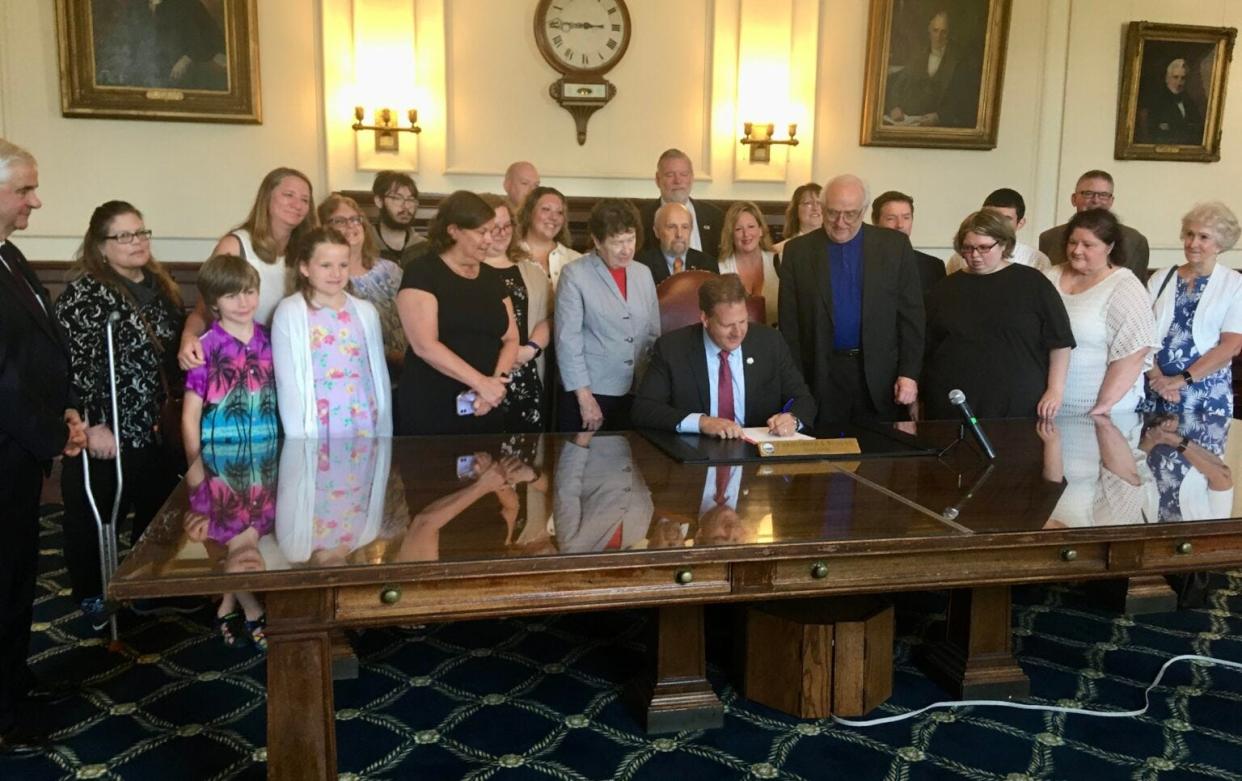NH creates special education watchdog agency: Parents of kids with disabilities applaud.

To Kate Shea, dealing with her school’s special education adjudication process was “the tale of two children.”
One of her sons came to the Goffstown School District with an autism diagnosis, confirmed by a neuropsychological investigation Shea paid for. Through advocacy, she helped him receive speech and occupational therapy from the school district, allowing him to regulate his behavior and emotions at school.
Shea’s second oldest child — and her other children — were denied similar services by the school district, Shea says, a decision she believes was inconsistent and unfair. Without the extra support, those students struggled. Eventually, Shea decided to withdraw them and enroll them in the Virtual Learning Academy Charter School, an online public charter school.
That outcome is a result, in part, of a reluctance of some school administrators to provide what can be expensive services, Shea believes. And other parents Shea knows in the state have had similar experiences of denials, too. Shea helped form “an informal moms group,” bringing together families who have struggled to secure the services they believe are appropriate for their children.
“Parents keep a notebook with: ‘Who do I call next? What do I do next?’ Because this child is sinking, they’re struggling, they’re also becoming depressed at an age where they shouldn’t be depressed,” Shea said.
A new law will give the state more involvement in the issue. Senate Bill 381, signed July 1, creates a new, independent agency to help oversee how schools provide special education services to students, and to provide a point of contact for parents navigating the process.
The new advocate will be looking at how schools go about creating an individualized education program (IEP) — the plan that determines the services the school will provide. Public schools are obligated under the Individuals with Disabilities Education Act to provide a “free and appropriate” education to students with disabilities; IEPs are the mechanism by which parents and administrators agree on those services.
New Hampshire’s new official will be the “advocate, coordinator, and point of contact for those parents, guardians and caretakers of students with disabilities,” the law states.
Who New Hampshire’s first advocate for special education will be — and what their responsibilities will look like — has not yet been determined.
The new office has been opposed by the state’s Office of the Child Advocate and the disability rights group ABLE NH, who argue the office carries too broad of a mandate, will squander state resources, and that the oversight responsibility for IEPs should lie with the existing child advocate.
But parents of children with disabilities say they’re elated about the new position.
“There’s single points of failure,” said Shea, speaking on the situations that have frustrated some parents. “And if we can have somebody in there at those single points of failure early on, what it means is the child gets what they need. It’s usually a small amount of help and services. We’re talking 30 minutes a week of this or 30 of that.”

Other parents who attended the signing ceremony say they’ve been similarly irritated by school district decision-making over IEPs. Patricia Eno, who showed up with her son Samuel, said that lack of services provided to her son had caused him to become depressed and miss classes.
Samuel is on the autism spectrum. In elementary and middle school, he received support to help him navigate his classes. But after Samuel entered high school in Salem as a freshman, Eno found herself seeking out occupational therapy and tutoring outside of the school district due to a lack of necessary services provided by the school. She is presently suing the Salem School District in Rockingham County Superior Court over a claim that the district did not reimburse her for tutoring that should have been included in her son’s IEP.
Samuel says the lack of support caused his grades to slip precipitously, falling into the D and F range.
“I had a slump where I just didn’t go to school for months at a time,” he said. “And it didn’t change anything at all either because they didn’t give me anything.”
Gov. Chris Sununu said he hoped the bill would create a counterweight to schools.
“We have an amazing system,” Sununu said at the bill signing ceremony in Concord. “We have wonderful public schools. We have wonderful special ed teachers. We just need to make sure the system has balance and in the rare cases that there is imbalance that there’s an advocate on the other side.”
Sununu said he decided to sign the bill in part due to the advocacy of his wife, Valerie, a former special education teacher. After leaving her post as a teacher, she became an advocate for parents, the governor said.
“That opened my eyes way before I entered the political field about what parents really have to go through,” Sununu said.
The governor said he envisioned the special education advocate “working hand in hand” with the state’s Office of the Child Advocate.
But that office opposed the creation of the special education advocate, arguing during the legislative process that it would duplicate the work that the child advocate was already doing.
How the new office treats the job will likely be defined by whoever is the first to take office.
In a statement last Thursday, the governor’s office said Sununu would hold a “robust application and vetting processes” to find a candidate to nominate. The office plans to release details on how to apply this week, the office said. The chosen candidate will then need to be approved by the Executive Council, which will hold a public hearing.
State Sen. John Reagan said that the new advocate would help to counteract the potential for school districts to dissuade some families from receiving all of the services they want for their children. That reluctance is often driven by a lack of special education staff and a desire to keep district budgets manageable, Reagan argued.
“With this, we’ll have a person who will actually advocate, actually be a voice for the parents to help them get their children to not be excluded from a normal life,” said Reagan, a Deerfield Republican.
Rep. Glenn Cordelli, a Tuftonboro Republican who supported the bill, said he expected an “influx” of cases once the office is created. “There’s a lot of pent up frustration in the system,” he said.
But Cordelli said he does not expect the advocate to act as a pro bono attorney for families’ cases. Rather, he said, the advocate would provide guidance to parents while holding school districts accountable through reports and case studies, similar to the Office of the Child Advocate.
Cordelli said the office would ideally take up investigations on a district-by-district basis, allowing it to issue specific recommendations based on that district’s policy rather than broader guidance. But he said the reports that the office generates could help guide the Legislature to make broader changes.
“We certainly can look at what the advocate finds in the next couple of years,” he said.
For Shea, the law is the culmination of months of advocacy with her moms group. In addition to providing support for each other, the group has also banded together to create pressure to pass legislation. They lobbied for House Bill 1513, which extended the age eligibility for students with disabilities by one year, allowing Department of Education reimbursement to flow to schools until a student’s 22nd birthday. Sununu signed that bill in June. They also came out in strong support of the special education advocate position.
The group is politically diverse, but united in their frustration. “We probably all vote different ways,” Shea said. “But we all found we had a common issue amongst us, which was with our kids.”
This story was originally published by New Hampshire Bulletin.
This article originally appeared on Portsmouth Herald: NH's new special education watchdog agency cheered by parents

